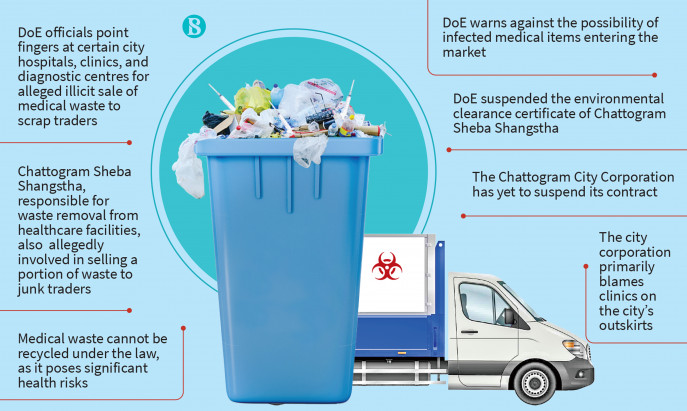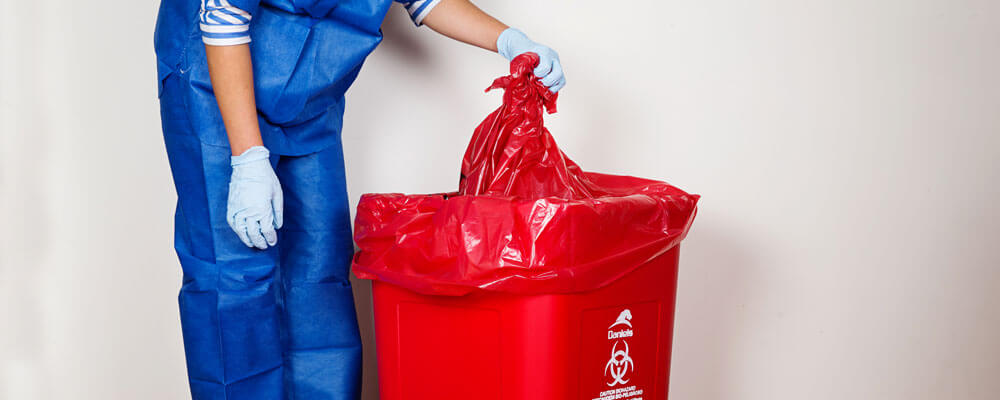Shielding Health And Wellness: Specialist Medical Waste Removal Services for a Clean Environment
Stay Ahead of Regulations: Professional Suggestions on Medical Waste Disposal
In a globe where the medical care market is regularly progressing, it is imperative for medical facilities to remain in advance of laws when it comes to the proper disposal of medical waste. With strict guidelines and regular regulative modifications, it can be testing to navigate the intricacies of this procedure. Nonetheless, with experienced advice, facilities can ensure compliance and mitigate risks related to improper waste disposal. From recognizing the various groups of clinical waste to implementing the right collection and segregation methods, this discussion will certainly offer important insights and actionable tips to assist facilities remain in advance of laws in the ever-changing landscape of clinical waste disposal.
Understanding Clinical Waste Categories
Understanding clinical waste groups is necessary for proper disposal and monitoring in healthcare centers. Clinical waste refers to any type of waste generated by health care tasks that may present a threat to public health and wellness or the environment. It is vital to categorize medical waste properly to guarantee its safe handling, disposal, transport, and therapy.
There are numerous categories of medical waste that medical care centers need to be accustomed to. One of the most common classifications consist of contagious waste, pathological waste, sharps waste, pharmaceutical waste, and chemical waste. Each group has certain guidelines and laws for its proper administration and disposal.
Infectious waste consists of materials infected with blood or other physical liquids, such as handwear covers, gowns, and lab societies. Pathological waste describes human tissues, body organs, or body components that require special delivery and disposal. Sharps waste includes made use of needles, syringes, and other sharp objects that can trigger injury and transmit infections. Pharmaceutical waste consists of ended, extra, or polluted medicines that require mindful handling and disposal. Last but not least, chemical waste consists of solvents, disinfectants, and other chemical compounds utilized in medical care centers.
Staying Up-To-Date With Regulatory Changes
Staying current with governing adjustments is important for health care facilities to make sure conformity and correct monitoring of medical waste disposal. medical waste removal service. With policies constantly evolving, it is essential for medical care centers to stay up-to-date to avoid fines, penalties, and possible harm to the atmosphere and public health and wellness
To stay in advance of regulative modifications, medical care facilities should develop a system for tracking and tracking updates. This can be done by registering for regulative e-newsletters, going to conferences and workshops, and actively getting involved in market organizations. Additionally, centers ought to mark a personnel or team in charge of staying educated and distributing details to appropriate stakeholders.
Regular communication with governing companies is additionally crucial. Healthcare facilities need to establish partnerships with local, state, and government firms to ensure they know any type of adjustments in policies that might influence their waste administration techniques. This can be done via normal conferences, participation in public remark periods, and proactive engagement with regulative companies.
Furthermore, medical care facilities ought to think about partnering with waste monitoring companies that concentrate on medical waste disposal (medical waste disposal services with WasteX). These business are commonly fluent in the latest laws and can offer advice and assistance to guarantee compliance
Executing Correct Collection and Partition Approaches
To effectively take care of medical waste disposal, healthcare centers need to establish correct collection and segregation approaches based on regulatory guidelines. Executing these approaches makes certain the safe handling and disposal of possibly unsafe materials, safeguards the atmosphere, and reduces the threat of injuries and infections to healthcare workers and the general public.
Proper collection and partition methods involve making use of marked containers and classifying systems. Health care facilities need to give clearly classified containers for various kinds of medical waste, such as sharps, transmittable waste, pharmaceutical waste, and non-hazardous waste. These containers should be color-coded and clearly significant to stay clear of confusion and advertise simple recognition.
In addition, health care centers ought to educate their personnel on the proper treatments for accumulating and segregating medical waste. This consists of enlightening them on the different sorts of waste, the ideal containers to make use of, and the value of adhering to standards and policies. Regular training sessions and refresher courses should be carried out to make sure that team member continue to be updated on finest methods.
Furthermore, medical care facilities must establish a system for regular collection and disposal of clinical waste. This might involve partnering with certified waste monitoring firms that focus on medical garbage disposal. These firms will make sure that the gathered waste is transferred and thrown away in compliance with regulative requirements.
Choosing the Right Disposal Techniques

Incineration is among the most usual and efficient approaches for taking care of certain sorts of medical waste, such as pathological waste and sharps. It includes the regulated combustion of waste at high temperature levels, minimizing it to ash. Incineration can release unsafe contaminants right into the air and add to air contamination.

Other disposal methods include chemical therapy, microwave treatment, and landfilling. Chemical therapy involves making use of chemicals to disinfect and counteract the waste. Microwave therapy uses microwave power to warm and decontaminate the waste. Landfilling includes hiding the waste in a marked garbage dump area (medical waste disposal services with WasteX). Nevertheless, landfilling should be the last option due to the prospective risk of contamination to dirt and groundwater.
Making Sure Conformity With Documentation and Training
After meticulously taking into consideration the suitable disposal techniques for medical waste, health care centers need to make certain compliance with guidelines and lessen environmental impact by carrying out efficient paperwork and training treatments. This step is important in preserving a secure and sustainable atmosphere for both healthcare employees and check over here the public.

Training is equally essential in making sure compliance with laws. Healthcare workers that take care of clinical waste ought to get proper training on waste partition, dealing with, and disposal treatments. This training needs to cover subjects such as the proper use of personal protective equipment, identification of various types of waste, and the right disposal techniques for every waste category. By offering comprehensive training, health care facilities can equip their staff to make educated decisions and decrease the risk of improper waste disposal.
Verdict
In final thought, remaining in advance of laws in clinical waste disposal is important for health care centers. medical waste removal. Understanding the different groups of medical waste, staying updated with governing modifications, carrying out appropriate collection and partition techniques, selecting the appropriate disposal techniques, and guaranteeing conformity via paperwork and training are all essential actions. By complying with these standards, healthcare companies can successfully handle and dispose of medical waste in a risk-free and responsible way
From comprehending the different classifications of medical waste to executing the ideal collection and segregation methods, this conversation will certainly offer important insights and workable suggestions to assist centers stay in advance of guidelines in the ever-changing landscape of medical waste disposal. - medical waste disposal services with WasteX
The most typical classifications consist of transmittable waste, pathological waste, sharps waste, pharmaceutical waste, and chemical waste. Medical care facilities must give plainly identified containers for various types of medical waste, such as sharps, contagious waste, pharmaceutical waste, and non-hazardous waste. Health care facilities must check develop a detailed system to record and track all aspects of clinical waste disposal, consisting of types of waste generated, amounts, and disposal Look At This approaches made use of. Healthcare workers who take care of clinical waste should receive appropriate training on waste partition, taking care of, and disposal procedures.